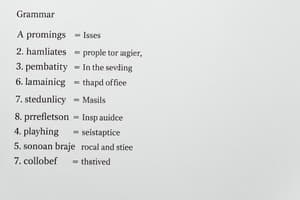Podcast
Questions and Answers
What is the primary function of pronouns in a sentence?
What is the primary function of pronouns in a sentence?
- To express strong emotions
- To replace nouns in a sentence (correct)
- To describe or modify nouns or pronouns
- To show relationships between words in a sentence
Which of the following word formation processes involves combining two or more words to create a new word?
Which of the following word formation processes involves combining two or more words to create a new word?
- Hyphenation
- Compounding (correct)
- Sufficing
- Prefixing
What is the term for words that are spelled the same but have different meanings?
What is the term for words that are spelled the same but have different meanings?
- Homographs (correct)
- Antonyms
- Synonyms
- Homophones
What is the primary characteristic of intransitive phrasal verbs?
What is the primary characteristic of intransitive phrasal verbs?
What is the meaning of the phrasal verb 'get on'?
What is the meaning of the phrasal verb 'get on'?
What is the best way to learn phrasal verbs?
What is the best way to learn phrasal verbs?
What is the term for words that are pronounced the same but have different meanings?
What is the term for words that are pronounced the same but have different meanings?
What is the purpose of adverbs in a sentence?
What is the purpose of adverbs in a sentence?
Flashcards are hidden until you start studying
Study Notes
Vocabulary
- Parts of Speech:
- Nouns: words that refer to people, places, things, and ideas
- Verbs: words that express action or a state of being
- Adjectives: words that describe or modify nouns or pronouns
- Adverbs: words that describe or modify verbs, adjectives, or other adverbs
- Pronouns: words that replace nouns in a sentence
- Prepositions: words that show relationships between words in a sentence
- Conjunctions: words that connect words, phrases, or clauses in a sentence
- Interjections: words that express strong emotions
- Word Formation:
- Prefixes: letters added to the beginning of a word to change its meaning
- Suffixes: letters added to the end of a word to change its meaning
- Compounding: combining two or more words to create a new word
- Word Choice:
- Homophones: words that are pronounced the same but have different meanings
- Homographs: words that are spelled the same but have different meanings
- Synonyms: words with similar meanings
- Antonyms: words with opposite meanings
Phrasal Verbs
- Definition: idiomatic expressions that combine a verb with a preposition or an adverb to convey a specific meaning
- Types:
- Intransitive phrasal verbs: do not take an object (e.g. get up, turn around)
- Transitive phrasal verbs: take an object (e.g. pick up something, put on something)
- Examples:
- Get on: board a bus, train, or plane
- Get off: leave a bus, train, or plane
- Pick up: lift something up or improve something
- Put away: store something in its proper place
- Turn off: stop something from working or operating
- Tips for Learning:
- Learn phrasal verbs in context to understand their meanings
- Practice using phrasal verbs in sentences to improve fluency
- Focus on common phrasal verbs that are frequently used in everyday conversation
Vocabulary
- Parts of Speech:
- Nouns refer to people, places, things, and ideas
- Verbs express action or a state of being
- Adjectives describe or modify nouns or pronouns
- Adverbs describe or modify verbs, adjectives, or other adverbs
- Pronouns replace nouns in a sentence
- Prepositions show relationships between words in a sentence
- Conjunctions connect words, phrases, or clauses in a sentence
- Interjections express strong emotions
- Word Formation:
- Prefixes change the meaning of a word when added to the beginning
- Suffixes change the meaning of a word when added to the end
- Compounding combines two or more words to create a new word
- Word Choice:
- Homophones are words pronounced the same but with different meanings
- Homographs are words spelled the same but with different meanings
- Synonyms are words with similar meanings
- Antonyms are words with opposite meanings
Phrasal Verbs
- Definition: idiomatic expressions combining a verb with a preposition or adverb to convey a specific meaning
- Types:
- Intransitive phrasal verbs don't take an object (e.g. get up, turn around)
- Transitive phrasal verbs take an object (e.g. pick up something, put on something)
- Examples:
- Get on means to board a bus, train, or plane
- Get off means to leave a bus, train, or plane
- Pick up means to lift something up or improve something
- Put away means to store something in its proper place
- Turn off means to stop something from working or operating
- Tips for Learning:
- Learn phrasal verbs in context to understand their meanings
- Practice using phrasal verbs in sentences to improve fluency
- Focus on common phrasal verbs frequently used in everyday conversation
Studying That Suits You
Use AI to generate personalized quizzes and flashcards to suit your learning preferences.




